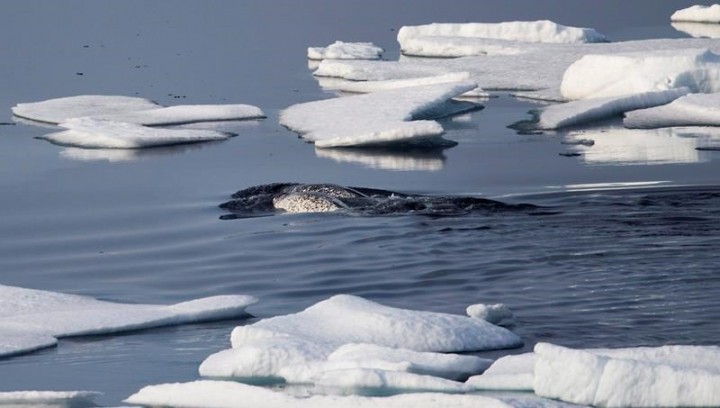Hunters from Pond Inlet, Nvt. — known as Mittimatalik in Inuktitut — have said they’re seeing fewer narwhal in areas where they were once abundant, making it harder to feed their families, and that the whales’ behaviour is changing.
Lisa Koperqualuk, vice chair of the Inuit Circumpolar Council, says that’s because of noise from ships.
“It impacts our culture when marine animals are disturbed and are not in their usual places,” she said, adding hunters have to travel further to find narwhal.
Research has found narwhal are sensitive to noise. Aerial surveys indicate their numbers are declining in Eclipse Sound on the northeastern end of Baffin Island during the summer.
A 2020 report by the Fisheries Department suggests that could be due to increasing ship traffic from mining, cruises, ice breaking and development, as well as other factors such as the presence of killer whales or natural movement in the region.
Newly revised international guidelines on reducing underwater noise from ships recognize the unique effects on Inuit, but environmental and Inuit organizations say stronger measures are needed.
The International Maritime Organization’s subcommittee on ship design and construction met in London last week, where members agreed on revisions to the 2014 guidelines. They include updated technical knowledge and sample templates for underwater noise management plans.
The draft updated guidelines also reference Indigenous knowledge and Inuit Nunaat, or Inuit homeland in the United States, Canada, Greenland and Russia. There, it states effects from underwater noise on marine life could be greater due to ice breaking, the presence of noise-sensitive species and Indigenous hunting rights.
“That is something ICC is really encouraged about because really we are the first Indigenous organization to have a voice at the IMO,” Koperqualuk said.
The council, which represents about 180,000 Inuit worldwide, wanted a separate section included in the guidelines focusing on challenges particular to the Arctic and Inuit Nunaat. For instance, it said noise travels further in cold water and expressed concern about the consequences for marine species Inuit rely on for food, culture and livelihoods.
Koperqualuk said there was interest in specific recommendations for ships operating in these waters, such as using Indigenous knowledge in voyage planning, but the north-specific section was ultimately not included in the guidelines because it’s not universally applicable.
Koperqualuk also noted the guidelines are voluntary and there has been little uptake by ship owners.
Andrew Dumbrille with the Clean Arctic Alliance, made up of 20 non-profit organizations, agreed there is a need for mandatory measures.
He pointed to a 2019 study on implementation of the existing guidelines overseen by World Wildlife Fund Canada, the Chamber of Shipping America, World Maritime University and Transport Canada. Several organizations reported they were a low priority as they are not mandatory as well as barriers such as the lack of baseline measurements for underwater noise or reduction targets.
“These new guidelines are more detailed and they have the latest science and latest perspective on not only underwater noise impacts but technology fixes and management solutions,” Dumbrille said.
“Unfortunately these guidelines are still voluntary and so that’s problematic on a number of levels.”
The revised guidelines are to be submitted to the Marine Environmental Protection Commission in July for approval.
A working group tasked with reviewing the guidelines ran out of time last week to finalize a list of suggested next steps, areas needing further research and assessment, and suggestions to increase awareness and uptake of the guidelines. Dumbrille said a correspondence group will continue that work.
“The pathway to regulatory measures is slow,” he said. “Some people are saying it’s not fast enough to respond to the threat and the urgency and the need around addressing underwater noise because our oceans are getting louder and that’s especially true for the Arctic.”
The Arctic has some of the lowest underwater sound levels on Earth, but research suggests that could change as new shipping routes open due to sea ice loss.
A study published in the scientific journal Environmental Pollution in October predicts underwater noise emissions from ships could double every 11 and a half years on average without incentives or regulatory steps. A 2021 report by the Arctic Council found noise pollution from ships had doubled in some areas of the Arctic between 2013 and 2019.
Fisheries and Oceans Canada says underwater noise has been linked to a wide range of effects on marine species that rely on sound, including behavioural changes, habitat loss, increased stress levels and permanent injury or death.
Transport Canada saidit’s pleased with the revised international guidelines, but acknowledged more work is needed.
In June 2021, Transport Canada announced the Quiet Vessel Initiative with $26 million in funding over five years to test the most promising technologies, vessel designs, retrofits and operational practices to make ships quieter. Ottawa has also been developing an Ocean Noise Strategy which, it expects to launch later this year.
This report by The Canadian Press was first published Feb. 4, 2023.
This story was produced with the financial assistance of the Meta and Canadian Press News Fellowship.
Emily Blake, The Canadian Press
